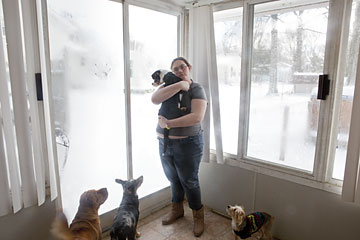
Glance through Kimberly Rhodes' medical records and the diagnoses read like a complete spreadsheet of 21st century American health problems. She's gained 19 lb. (8.6 kg) in the past three years and developed insulin resistance, so she is now considered prediabetic. Her liver is embedded with layers of fat that have scarred the healthy tissue around it and caused cirrhosis. The enzymes it produces, which serve as a marker for how well it is functioning, have plummeted 84%. So far, her blood pressure hovers just within normal range, but she's borderline hypertensive. She is regularly treated by a family doctor, a gastroenterologist and an endocrinologist, but if her blood pressure keeps rising, it would mean another doctor--a nephrologist--to track whether her kidneys are suffering any damage. These measures are fairly typical for the roughly two-thirds of adult Americans who are overweight or obese.
But Kimberly is 13 years old, and if she is unusual, it's only because of the severity of her various conditions, not that she suffers from them. Her liver condition makes her so fatigued, she prefers to be homeschooled these days, distancing her from the world of her peers. Kimberly's mother Stacey says the Ohio teen started gaining weight "out of nowhere" when she was 4. "I am heartbroken. As a parent you never want to hear your daughter or son has any [health] problems, let alone a disease that may be a killer at one point," she says.
This is the American Nightmare--that for the first time ever, a generation of children may have a shorter life expectancy at birth than their parents. Obese children are at higher risk of heart disease, diabetes, stroke and atherosclerosis. They are twice as likely as their normal-weight peers to develop certain cancers and may be less likely to survive others.
In some ways, the premature sickening of a demographic that should be any society's healthiest is even worse than it seems. These kids aren't simply developing the diseases of adults; they are, in many ways, physically becoming adults. By the time they are barely 10, some obese children are pushed into puberty by bodies that are ready to reproduce even if they are not remotely ready to be sexually active. Their chromosomes show signs of wear in the same ways as those of much older people. Their tissues are accumulating the kinds of damage previously seen only in people of their parents' and grandparents' generations. Their very cells, if placed under a microscope, would look like an older person's, showing inflammatory and oxidative damage that is usually the result of a much longer, often indulgent life. Millions of middle schoolers are being prescribed medications that drug developers never intended for anyone under 40.
"I am thinking that we will have people in their 30s, 40s and 50s who should be at their most productive," says Dr. Siripoom McKay, a professor of pediatric endocrinology at Texas Children's Hospital, "who will be on dialysis or have had several heart attacks."
